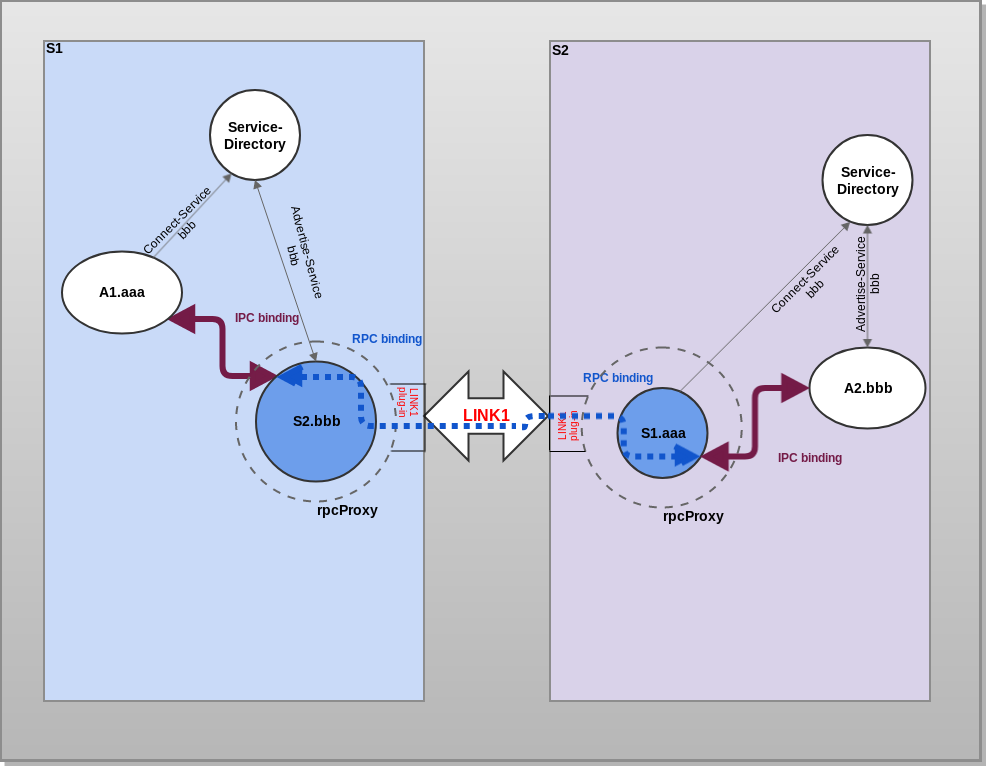Legato RPC
- Warning
- EXPERIMENTAL
Legato RPC provides a framework to support remote-procedural calls (commonly referred to as "RPC") between two Legato systems. Using RPC bindings, a Legato service is provisioned across two remote systems resulting in the client application, deployed on one system, being bound to the server application, deployed on a second system.
From the perspective of the client and server applications, there is no difference between a locally provided service (IPC) and a remotely provided service (RPC). They are unaware that the service is provisioned across two remote systems.

Defining a Legato service to be a RPC service requires,
- Declaring which applications and interfaces can be exported from a system. See extern for further information.
- Declaring how communication to a remote system is implemented. See links for further information.
Run-time Configuration
The Legato RPC framework depends on some of its configuration (RPC Bindings and RPC Systems) to be defined at run-time. In particular, the run-time configuration provides specific details about the RPC bindings and the remote system network connection configuration. The run-time configuration can be thought of as the 'routing' configuration for Legato RPC Services. It may change or vary over time and, therefore, cannot be defined statically at build time.
RPC Bindings
To specify the remote system on which a Legato RPC service is provisioned/bound, the Legato RPC framework requires a RPC binding to be defined. RPC bindings are run-time or set-up specific configuration, and must therefore be manually defined during the system set-up.
Location and format are, as follows:
rpcProxy/
bindings/
<interfaceName>/
systemName<string> == <systemName>
remoteService<string> == <remote interfaceName>
where,
- interfaceName is the network interface-Name. Must match the interface alias-name specified, at built time, in the "extern:" section of the .sdef file.
- systemName is the alias-name of the remote system. Must match the system alias-name specified in the RPC Systems.
- remote interfaceName is the network interface-name that has been exported by a remote system (i.e. specified in the remote system's "extern:" sections of the .sdef file). It must match exactly in order for the RPC framework to connect the RPC service.
RPC Systems
The RPC Systems contains the network configuration details to enable connecting to a remote system. As with RPC bindings, RPC systems are run-time or set-up specific configuration, and must therefore be manually defined during the system set-up. Because the implementation of the network communication plug-in will vary depending on the nature of the underlying communication technology, the RPC Systems configuration will also vary and depend on the specific technology.
Location and format are, as follows:
rpcProxy/
systems/
<systemName>/
<linkName>/
<arg0> == <arg0 string>
<arg1> == <arg1 string>
....
where,
- systemName is the alias-name of the remote system. Must match system alias-name specified in the RPC Bindings.
- linkName is the link-name alias defining the network communication to a remote system. Must match the link alias-name specified, at build time, in the links.
- argX is a command-line argument vector for specify configuration data specific for a communication technology.
RPC Configuration Tool
To specify the RPC Bindings and Systems, a Legato RPC Configuration Tool has been provided.
Status
RPC is an EXPERIMENTAL Alpha-quality feature that is actively under development, and may be subject to future changes, which may not be backwards compatible.
As an Alpha-quality feature, the RPC framework may be unstable or incomplete, and may contain bugs or other related issues.
Please use at your own discretion.
Feedback can be provided through our Legato Forum, forum.legato.io.
Restrictions and Limitations
- Legato RPC is currently restricted to a two (2) system network.
- A brand new Legato target system will NOT contain any RPC run-time configuration.
- RPC run-time configuration must be set-up/changed, using the Legato RPC Configuration Tool, before a RPC services can start.
- Changes to the RPC run-time configuration will only take effect after (1) a system restart or (2) a RPC Proxy application restart.
- Currently, only a single implementation of the le_comm.h is available for use, networkSocket.
- The networkSocket le_comm implementation currently supports TCP/IPv4 sockets only.
- IP Address assignment and network reachability must be established outside of the RPC framework (i.e. the networkSocket expects the remote system to be reachable at the Network layer).
Test Status
Legato RPC has been tested for the following use-cases:
- Linux <--> Linux
Sample Application
To help demonstate the concepts of RPC, a sample application has been provided. Hello RPC
Copyright (C) Sierra Wireless Inc.
